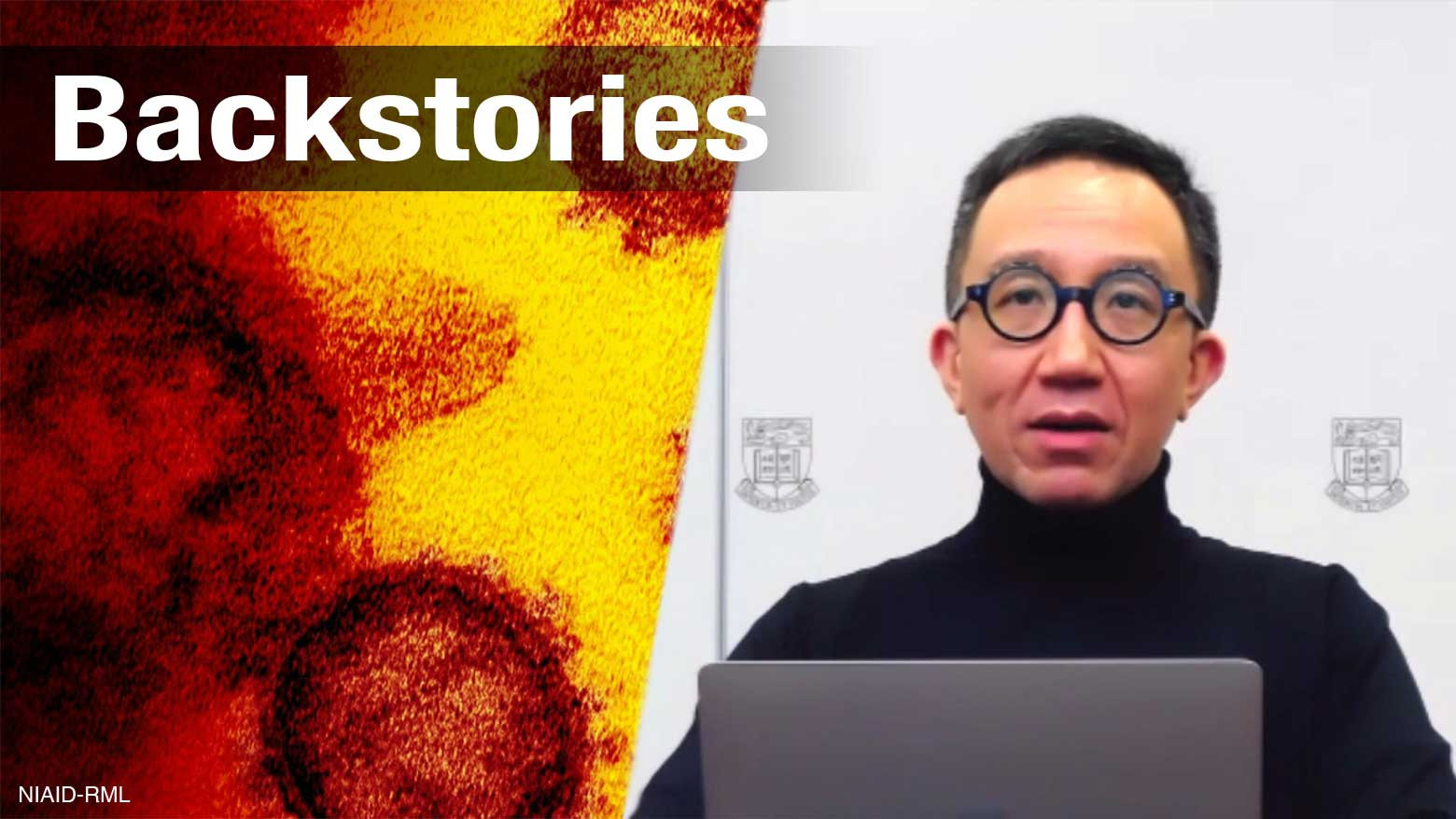Ebara: What have you learned about how the virus affects humans?
Leung: We know that there seems to be a very wide spectrum of clinical presentation. It could infect you and you would show little or no symptoms and then recover, perhaps never knowing that you had been infected in the first place. And then many people who are infected develop mild symptoms that are self-limiting. They would go on and recover by themselves whereas still others develop fairly moderate to severe disease and develop full-blown pneumonia. And then a small proportion of people go on to be very, very seriously ill, needing ventilators or respirators and intensive care. We still haven't quite figured out who would get very ill and who tends to be relatively mild in presentation. But we know that it disproportionately affects older folks, so older adults are at particularly high risk of serious illness and, frankly, death, and that is why it is so important to protect the elderly from this infection.
Ebara: What's the mode of transmission?
Leung: We know that this is probably mostly spread by respiratory droplets. Every time we speak, or when we eat, we tend to have some droplets come out of our mouths. And of course, if we have a sneeze or a cough, then clearly we would also be spreading droplets. That's mostly how it spreads although we cannot rule out some small proportion of infections passing from one person to another by airborne particles or by aerosols, and that is why it is so difficult for us to control this.
The other thing that we should know is that a substantial minority proportion, somewhere I guess between 20 to 40% of all infections, were spread by the infected patient when they themselves had very little or no symptoms, that is when they're in their incubation stage of the illness. And finally, we know that on average, typically an infected person would pass it to two to three other people.

Ebara: What do you think of the effectiveness of lockdown or stringent stay-at-home measures?
Leung: There are three pillar strategies that we deploy in public health. One is border restrictions and just about every country has imposed these border restrictions, both with the outside world but also, in some larger countries, within their countries, between metropolitan areas. Border controls are really for stopping importation and exportation of cases.
Then you have the quarantine and isolation. And then the third, which is the most destructive socially and economically, is the so-called physical distancing lockdown where basically everything stops. Schools are suspended, work and all economic activities basically grind to a halt and therefore it is something that affects everybody in that particular society.
And so, for each of these strategies, there are appropriate stages during the epidemic when we might apply them but there are also other stages of the outbreak when these measures may not work as well as they are sometimes thought to.
Ebara: What should governments be mindful of when carrying out these measures?
Leung: Health protection is task number one. But if the economy completely tanks there are consequences, and these consequences must be made explicit and the trade-offs must be also made transparent. There's (another) dimension, and that is social consent and the mental and emotional wellbeing of the population. I suppose you could call it social acceptance. If you impose very strict draconian measures such as a complete lockdown, it affects everybody. You cannot do this forever. There is a tolerance limit to any and all such measures. And that's why health protection, economic protection and social consent and social acceptance… it's a perennial tug of war, three ways, as we go forward until we have sufficient immunity, either preferably by vaccination, but possibly by natural infection and recovery, because this is not going to settle down until (there is) sufficient immunity in the population.
Ebara: In Hong Kong, there has been a period when civil servants on work-from-home orders have been allowed to return to the office. How many rounds of constraints will be necessary?
Leung: Well actually we have, as you put it, actually asked civil servants, as well a lot of employers, to allow employees to go back home and adopt flexible working arrangements. But then during the month of February, for part of it, there was some relaxation because our epidemic was actually heading in the right direction. And then as of mid-March, we have re-instituted these flexible work arrangements. And so civil servants as well as most actual workers, especially those who can work from home, are now working from home.
Ever since then we've seen reassuring signs, i.e. the real time, instantaneous reproductive number, that that has now come back down below one. In fact the latest estimate is somewhere around 0.7 to 0.8, which is quite reassuring, although we're not at all letting up our guard against a possible recrudescence. So that is why we are still keeping with very stringent and drastic social distancing measures at the moment.

Ebara: How long do you think it will take for people to get back to normal life?
Leung: I think that there is going to be a cycle of suppression and lift until we have sufficient immunity in the population. So I think we're going to see a few more of these "suppression and then lift and then suppress again" cycles before this whole pandemic is going to fade away.
Ebara: Japan was going to hold the Olympics this summer. Now they decided to postpone by just one year. Do you think it will be possible for the country or any country to have such a mass gathering of people, athletes and travelers in one year?
Leung: Well first of all let me say that I think it's a very brave and sensible decision and I think that it's a very difficult decision, but I think it's the right decision. I think it really depends on the picture we get when we have the first results of the serological surveys, that are now being started, in different places around the world. These first serological surveys are going to give us some idea (of) the extent of immunity in different places around the world as they experience and come out of the first wave of this pandemic. If a substantial proportion come out, having acquired natural immunity, and if we actually have an optimistic vaccine candidate that can be quickly scaled up in terms of production and distribution, to roughly about half of the people around the world, then we may well actually see a quicker rather than a slower resolution of the pandemic.
If on the other hand, serological survey results show us that even after a first wave of this pandemic, we don't have nearly as many people (as we thought) who may have been infected but didn't know it, then we may need to plan for a much longer horizon … before this pandemic is going to settle down and fade away. So I think it really depends on some of these critical scientific studies, many of which the WHO is actually coordinating and leading, and therefore I think the picture will be much clearer in the next one or two months.
Ebara: This century is defined by the rise of the new economies and more people are moving in masses everywhere but there were risks involved, which we perhaps weren't paying attention to. What could we have done differently?
Leung: I think clearly this is a key question which economists, businesses, but also everyday people like you and I must answer in the aftermath of COVID-19. We know that after decades of increasing connectedness because of globalization, we have made huge gains and huge strides and huge improvements in living but sometimes, and in fact quite substantially, at the expense of inequalities or inequities. This particular pandemic has shown us that global supply chains are not impregnable. What geopolitics and economic forces have not been able to do, COVID-19 has just about done it, and that is to completely sever and disrupt global supply chains. How you can rebuild it and maintain a similar quality of life, and yet have some other way of protecting all of us from another pandemic, or similar black swan event, is really the most vexed question we have in governance all over the world today.
Ebara: What is your message to the world?
Leung: I think that it is very appropriate for all of us to really thank, from the bottom of our hearts, all the healthcare workers who have been at the clinical frontline, looking after sick patients, oftentimes at great personal risk to themselves.
I think that COVID-19 is going to be a real test of the global resolve to make sure the pandemic does not turn out to become one of the greatest health inequities of our century.
And (we must) let science lead and drive this particular response strategy. Let's all believe in science and let good science and good medicine lead us out of this pandemic. It is going to be a long marathon and we're all in it together. We must stick together, find time to really say how much we care about each other, and use this extraordinarily difficult period to find our own inner sense of deep humanity.
This interview was edited lightly for clarity.

